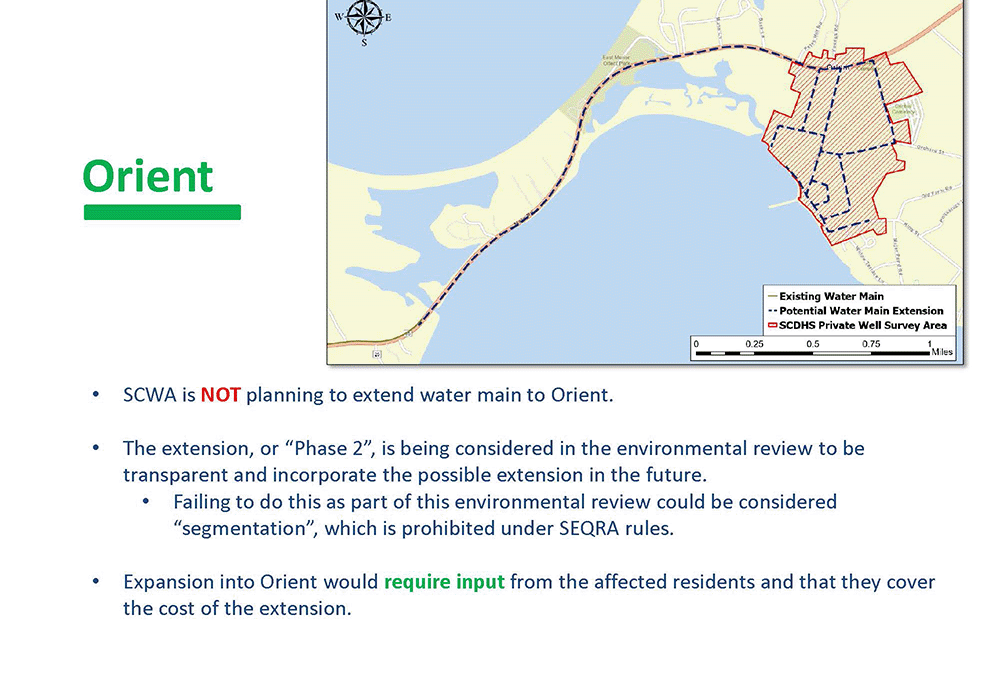The Orient Emergency Management Committee (OEMC) was created to help inform the residents of Orient about preparing, responding and recovering from emergency events that affect our community. It will work with the Southold Office of Emergency Management and will support the Orient Fire Department by allowing them to concentrate on true emergencies while OEMC will handle non-emergency matters such as opening shelters and warming/cooling centers during events. OEMC will also coordinate with the Orient Association to distribute timely and essential information. We plan to hold a sheltering training class soon and will be looking for volunteers to take the class to help run the shelters when opened.
The Atlantic hurricane season starts June 1st and runs for six months through November 30. Prepare now, learn what to do before a hurricane strikes. Create a disaster plan for you and your family since electricity and water could potentially be out for weeks.
It is highly unlikely that the Orient Causeway will be completely cut off from the East Marion for any length of time, and the Orient Fire Department can cross using their all-terrain vehicles for medical emergencies.
Orient will open shelters and evacuation centers if needed before the storm as a safe place to spend the duration of the storm. Shelters cannot be opened during the storm and will not be opened until the roads are all clear and safe to travel upon.
CONSIDER YOUR RISK AND RESPONSIBILITY
The Orient Fire Department is composed of residents who are highly trained emergency volunteers, and it has resources, but they are limited. The number one cause of death during a hurricane is storm surge. The temptation to “tough it out” in your home can put lives at risk, yours and the personnel who may be sent on an otherwise avoidable rescue mission.
If you live in an identified flood zone or SLOSH (Sea, Lake and Overland Surges from Hurricanes) area and know that your house has been inundated by water in past storms, then do not stay in your house during a severe storm or hurricane.
Do not ride out a storm on a boat.
For the medically or elderly fragile, families with small children and anyone who cannot sustain being in an environment with lengthy power outages, plan to leave ahead of time. Travel to a relative or friend located out of the storm impact area. Staying in a hotel is also an option.
If you have a second home that is not going to be affected by the storm path, then go to that home.
If an evacuation is ordered by Southold Township, then follow the instructions to evacuate and do so promptly.
GATHER SUPLIES TO CREATE AN EMERGENCY KIT
Create and regularly update an emergency supply kit for your home with the following recommendations:
- One gallon of water per person per day for at least three to seven days. Store in airtight containers and replace every six months.
- Store a three to seven day supply of non-perishable food for each person. Items such as canned or dehydrated food, powdered milk and canned juices should be rotated on a regular basis.
- Include paper or plastic plates and utensils
- Seven day supply of medications and medical items
- Special items for infant, elderly, or disabled family members.
- Personal hygiene supplies
- Don’t forget about a plan for pets- Food and supplies
- Manual can opener for food
- Alternate cooking source. Barbecue, charcoal, starter and matches in case utilities are out of services.
- Portable battery-powered or hand crank radio. Most telephones will be out of order. NOAA weather will be the best source of radio emergency information.
- Fire extinguisher for all types of fires. Teach all family members how to use it.
- Flashlights with extra, fresh batteries
- First aid kit. Know basic First Aid and CPR
- Whistle to signal for help
- Extra blankets and clothing may be required to keep warm. Sturdy shoes protect feet from broken glass and debris.
- Moist towelettes, garbage bags and plastic ties for sanitation
- Having Crescent or pipe wrench to turn off gas and water if necessary and know the location of the shutoff valves.
- Cell phone with chargers and alternative chargers (solar)
- Waterproof container for important documents such as insurance policies, medical records, bank account numbers, Social Security cards, checkbook, cash, credit cards, and ATM cards.
- Make sure your vehicle is fully charged or filled up with gas if a storm is coming.
- Have extra cash on hand since ATMs will most likely be down.
For additional information on creating a plan for your family visit ready.gov/plan.
SECURE YOU HOME
- Obtain and store materials, such as plywood, necessary to properly secure your home.
- Clear loose and clogged rain gutters and downspouts.
- Keep trees and shrubbery trimmed of dead wood.
- Check your insurance coverage. Flood damage is not usually covered by homeowners’ insurance. Inventory household items with photographs.
- Determine where to move your boat in an emergency.
- Consider purchasing a generator and learn how to use it safely.
CREATE A COMMUNICATON PLAN
- Take the time now to write down your hurricane plan and share it with your family.
- Know where your close family members are.
- Know how to receive emergency alerts.
- Determine family meeting places, and make sure to include an out-of-town location in case of evacuation.
- Designate an out of area friend or relative whom separate family members should call to report their whereabouts. Make certain all family members have that phone number.
- Write down on paper a list of emergency contacts, and make sure to include utilities and other critical services — remember, the internet may not be accessible during or after a storm.
Take precautions and prepare now to stay safe!
Recent Happenings

Southold Zoning Update Project – July 29, 2025 3-4pm

Orient Water Resources Study Is Finally Here!


